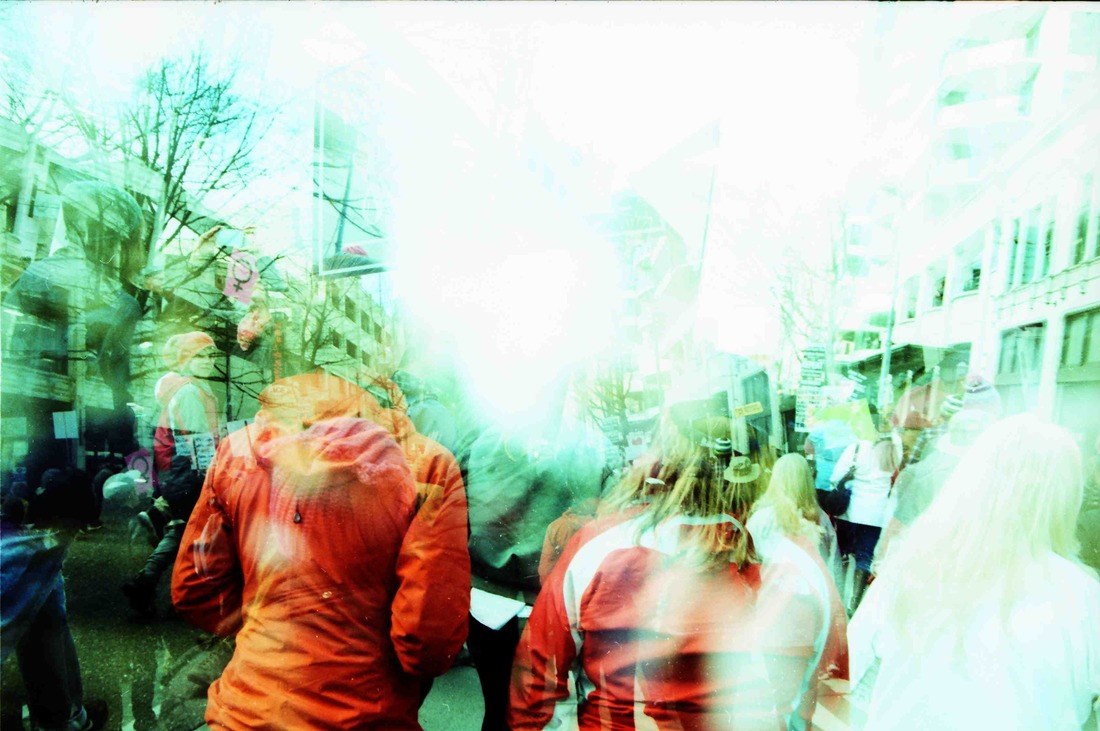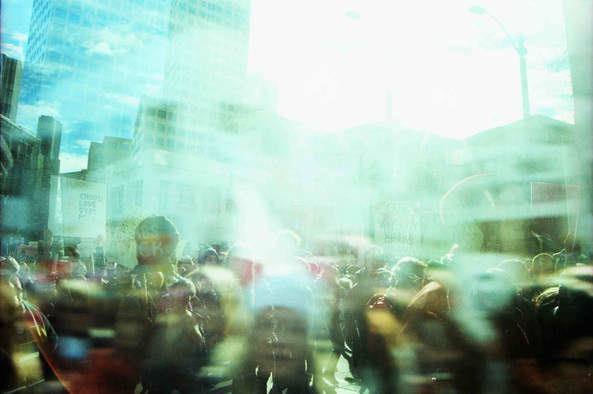|
Again, apologies for the intermittent posts these days as I wade through preproduction on my latest film. I'll be back to a regular posting schedule on March 5. One year ago last week, I packed my bag with rolls of film and a lens or two, boarding the bus downtown. Traveling through the tunnel, things seemed almost normal. Just an extra sign here, a dollop of pink hats there. Only when I rose above did I see it, an ocean of pink, approachable, drifting at walking speed. Had I ever seen so many people so quiet? Unbeknownst, I had happened upon the silent portion of the march. The visual and aural impact was remarkable. The human organism as collective, stretching out as far as the eye could see, but somehow, incredibly, hushed. You heard a thousand jackets ruffling, swishing jeans, the readjusting grip of hands on signs. We usually only see details; now you could hear them. And what to make of the feeling? There are events where people come together almost in spite of each other; this was different. It had a potency to it, a strange conflation of urgency and enthusiasm that shouldn't make sense, but did. In our house, women and minorities were always celebrated, not just because we fit into those descriptive terms: it simply made sense. Violence against women, from physical attacks to the more insidious arena of sublimation of agency and identity, was always abhorred. The recent fourth wave has felt, among other things, like the world catching up. Didn't these notions always make sense? In what way could they possibly be controversial? In my little cocoon, I thought we all were feminists. I was a child, and children know what side of the line to stand on. They don't hate or discriminate. We used to be so good at this. I don't wish to discount others' opinions, but I will share what I believe: the fight for women's rights is the fight for equal rights.*** Equality is additive; you don't lose something when others have a chance to prosper and be heard. There's nothing to be scared of here. Everyone benefits. What a crowd, I thought, slipping in with my camera. Why the turnout? Were we atoning for the sins of not voting? One of the traps of modern life is complacency. With this much stimuli, this much speed, you get swept up in the current. People don't form opinions nowadays; they get them from reviews online, op-eds and soundbites. We don't live life anymore; we document it. Urban life is too fast to experience, only to record. We jot it down with the latest technology, hoping for a mythical later time when we can finally review it all. Would that we lived so long. I don't have the answers to why we forgot to vote– I voted– but I suspect it has something to do with this pace and texture, perhaps similar to how the youth vote never materializes in any meaningful way: you get swept up in the distracted, cluttered wonder that is young adult life. Yes, we could ask the question, for which there is no good answer: where were all these people when it mattered? A lot of lives would be very different. But at some point getting angry at the past loses value. I realized there was something I could learn from those marching beside me. The toddler with a rainbow flag; the vet with a clever sign.* The women; oh, the women! The worst political sin in many generations had just been committed, harsh and regressive enough to make certain past warmongering presidents look downright lovable by comparison... and these folks around me were the victims of those sins. These were the people who had, in the blip of a moment, been reduced to second-class citizens. How did we live now? What did today feel like? Downright celebratory. The most surprising thing about the Women's March is how joyful it was. It'll hardly make sense on paper, but I'll try anyway. You really had to be there. This was the largest and most important march since the invention of the internet, not to mention the numerically largest protest in U.S. history, and the first time 4.6 to 5 million people worldwide engaged in the same specific activity at the same time on all seven continents, and I don't mean basic activities like eating or sleeping. That many people felt that strongly about the worldview reflected in a particular set of attitudes; so strongly they weren't going to let certain moral truths** be shunted aside. We were a crowd in the millions who believed in something, and it was basic: You should be nice to other people. All are equal, and should be treated accordingly. Fairly. What I didn't expect is how much joy being around people who think that causes. I felt so safe. Had I ever felt this safe, among thousands? This crowd. All genders, ages, races, orientations, income levels. Everybody could be who they were, could trust in the humanity of those next to them. We didn't have to hedge ourselves, didn't have to be concerned the person next to us thought differently. You would not be hated on in this beautiful space. Most marches you don't bring your kids to, but it made sense there were children everywhere. They get it. The truth we hope for was there, living on the smile of everyone's lips: love is additive. It burgeoned forth, snowballing, made by us. We were an air-feather-light cotton candy-happy tidal wave, and we had charged the air with the best of ourselves. That was the reason for the turnout. That was the reason I was there. It wasn't about voting. We had strong, deep-rooted values** of human decency, kindness, love. Equality. We needed to show each other, and not with a whisper, that we knew, loved... that we cared. And that we were not about to let those notions go down in the darkness. Now that is cause for celebration. *More photos from the March, Nathan-style, coming soon!
**Yes, I'm intentionally using language from the other side of the aisle here, for two reasons: I don't see the concerns of fourth-wave feminism as mere political issues. They're bigger than that. I appreciate my friends with differing sociopolitical perspectives, and don't want all my friends to think the same as me, but I hope they can understand equality as a human issue before anything else. There's no reason words like morals, virtue, family values, and so on should be co-opted by a political party. Ethics are ethics are ethics. ***What is feminism? Rebecca West wrote in 1913: "I myself have never been able to find out precisely what feminism is: I only know that people call me a feminist whenever I express sentiments that differentiate me from a doormat." From the April 27, 1895 edition of Athenaeum: "[a woman who] has in her the capacity of fighting her way back to independence." Nora, in Henrik Ibsen's 1879 A Doll's House: "Before anything else I'm a human being." Susan Faludi, 1991: "Feminism's agenda is basic: It asks that women not be forced to choose between public justice and private happiness. It asks that women be free to define themselves– instead of having their identity defined for them, time and again, by their culture and their men." A pulitzer-prize winning journalist, Faludi's book, Backlash: The Undeclared War Against American Women, is a landmark text exploring the anti-feminist backlash of the 1980s, and how political, social, and media entities were able to dismantle nearly all the progress of the previous decade, often using women themselves, by turning the language of feminism against itself and ultimately transforming "feminist" into what it remains in many circles today: a stigmatized, baggage-heavy bad word. Following what happened after first, second, and third-wave feminism, I expect a comparable backlash to occur against the current movement within the next decade or so. Just as compelling (and gigantic) is her 1999 follow-up, Stiffed: The Betrayal of the American Man, which explores why men feel emasculated all the time, and how the rhetoric of both anti-feminism (asserting men should dominate) and feminism (blaming men for culture's problems) actually imply about the same thing: that men are supposed to be in control. Except they generally don't feel that way. The book dives into how and why that is, from the impossibility of living up to post-WWII expectations of what a man is supposed to be, to the problematic "hero" concept, from which men are expected not to participate in society but rise above it, and how these unrealizable narratives manipulate and doom men in their own insidious ways, bringing as much unhappiness upon them as anyone else.
2 Comments
Lori
2/1/2018 04:44:23 pm
I also participated in last year's March. While I have marched in other protests before, this one felt different. I went into it with fear of violence and was prepared to be uncomfortable (it was cold, the route was long). I did not expect to feel exhilaration, but I did. The feeling that there were other people who felt the same way that I did and that we were registering our disapproval of the status quo was empowering.
Reply
Nathan
2/6/2018 12:41:21 am
Lori,
Reply
Leave a Reply. |
Nathan
Archives
July 2024
Categories |


 RSS Feed
RSS Feed
